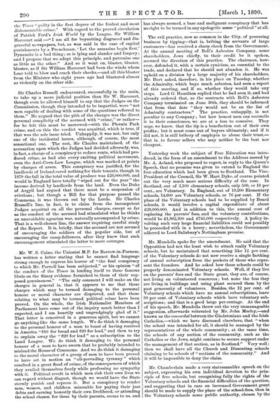Sir Charles Russell endeavoured, successfully in the main, to take
up a more judicial position than Sir W. Harcourt,
though even he allowed himself to say that the Judges on the Commission, though they intended to be impartial, were *" not men capable of dealing with some of the questions referred to them." He argued that the pith of the charges was the direct personal complicity of the accused with "crime," or rather— for he felt this must be narrowed—with the Phcenix Park crime, and on this the verdict was acquittal, which is true, if that was the sole issue tried. Unhappily, it was not, but only one of the incidental issues, although, of course, the most sensational one. The rest, Sir Charles maintained, of the accusation upon which the Judges had decided adversely, was, in fact, a charge of a conspiracy to reduce rents, which had pro- duced crime, as had also every exciting political movement, even the Anti-Corn-Law League, which was marked at points by charges of arson. This conspiracy was justified, for the landlords of Ireland cared nothing for their tenants, though in 1879 the fall in the total value of produce was 226,000,000, and would in England have totally "wiped out for the year" the income derived by landlords from the land. Even the Duke of Argyll had argued that there must be a suspension of evictions ; but though a Bill for that purpose passed the Commons, it was thrown out by the Lords. Sir Charles Russell's line, in fact, is to claim from the incompetent Judges acquittal on all the personal charges, except so far as the conduct of the accused had stimulated what he thinks an unavoidable agrarian war, naturally accompanied by crime. That is a well-chosen line, the answer requiring careful study of the Report. It is, briefly, that the accused are not accused of encouraging the soldiers of the popular side, but of encouraging the camp-followers, after they knew that such encouragement stimulated the latter to more outrages.






































 Previous page
Previous page